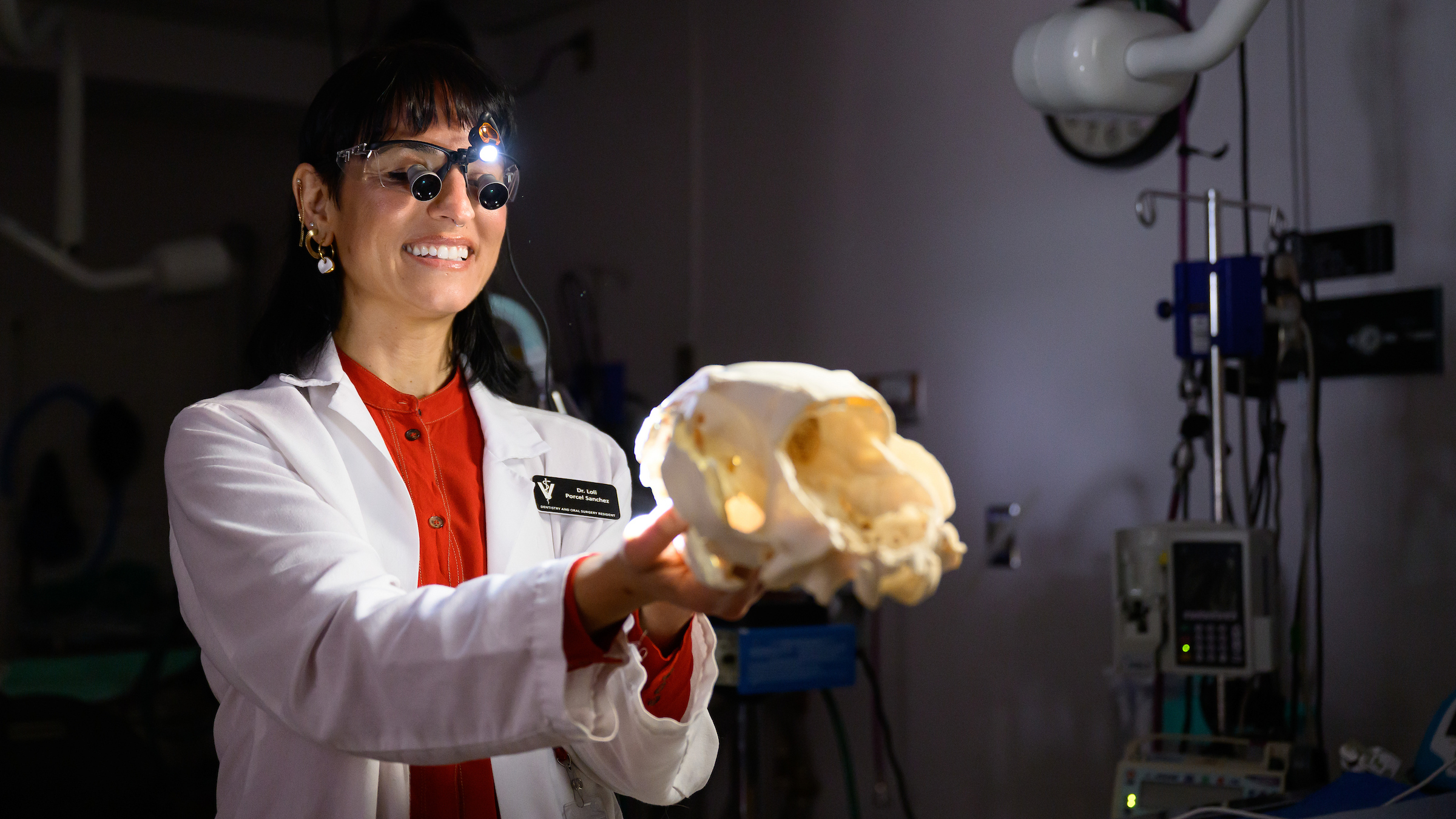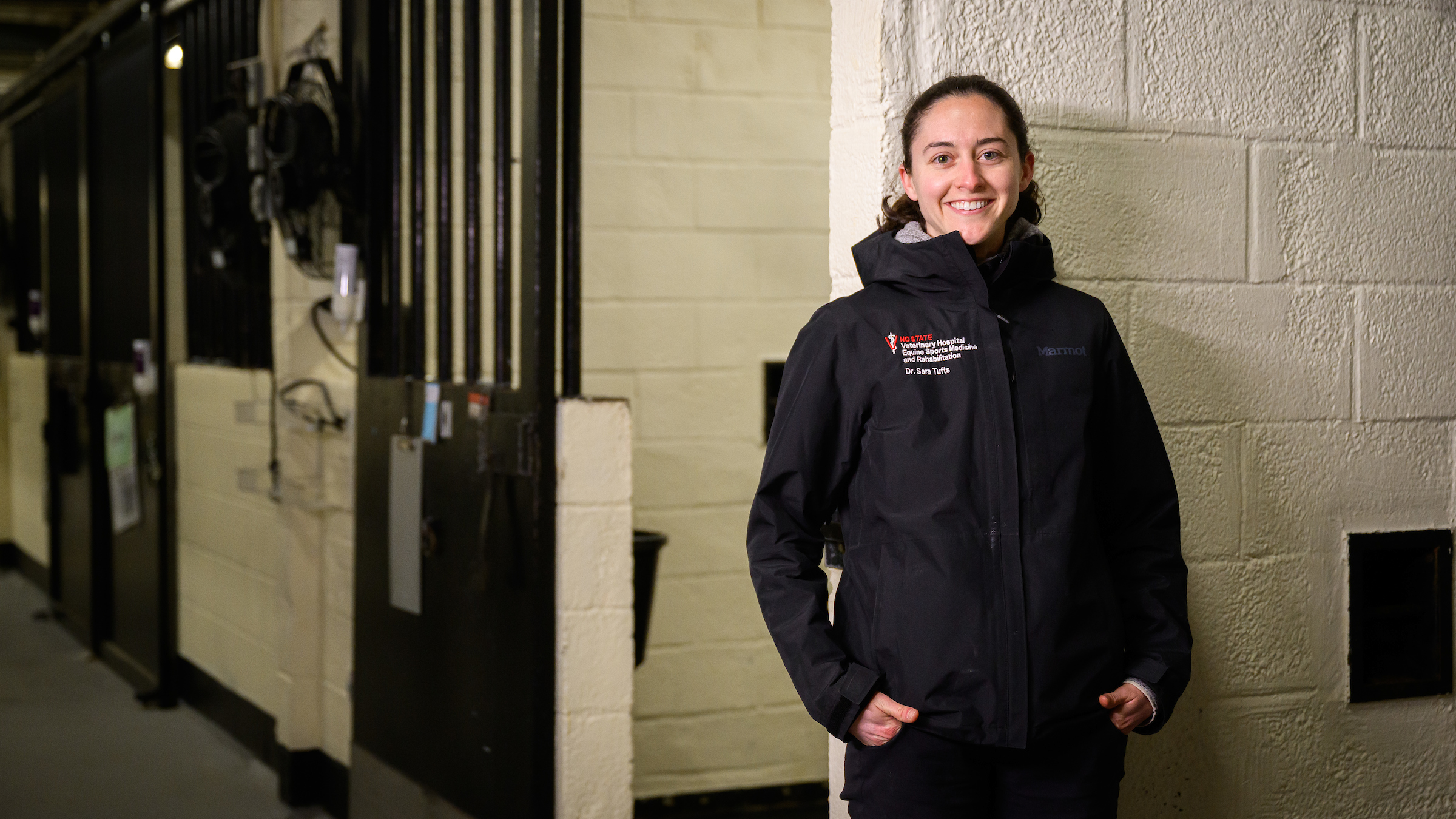House Officer Highlight: Through Unique Training Program, Pharmacist Compounds Her Own Rx for Success
With few veterinary pharmacy residencies nationwide, second-year clinical pharmacy resident Dr. Cassie Donnell found a program at NC State that lets her create her own niche within a niche.
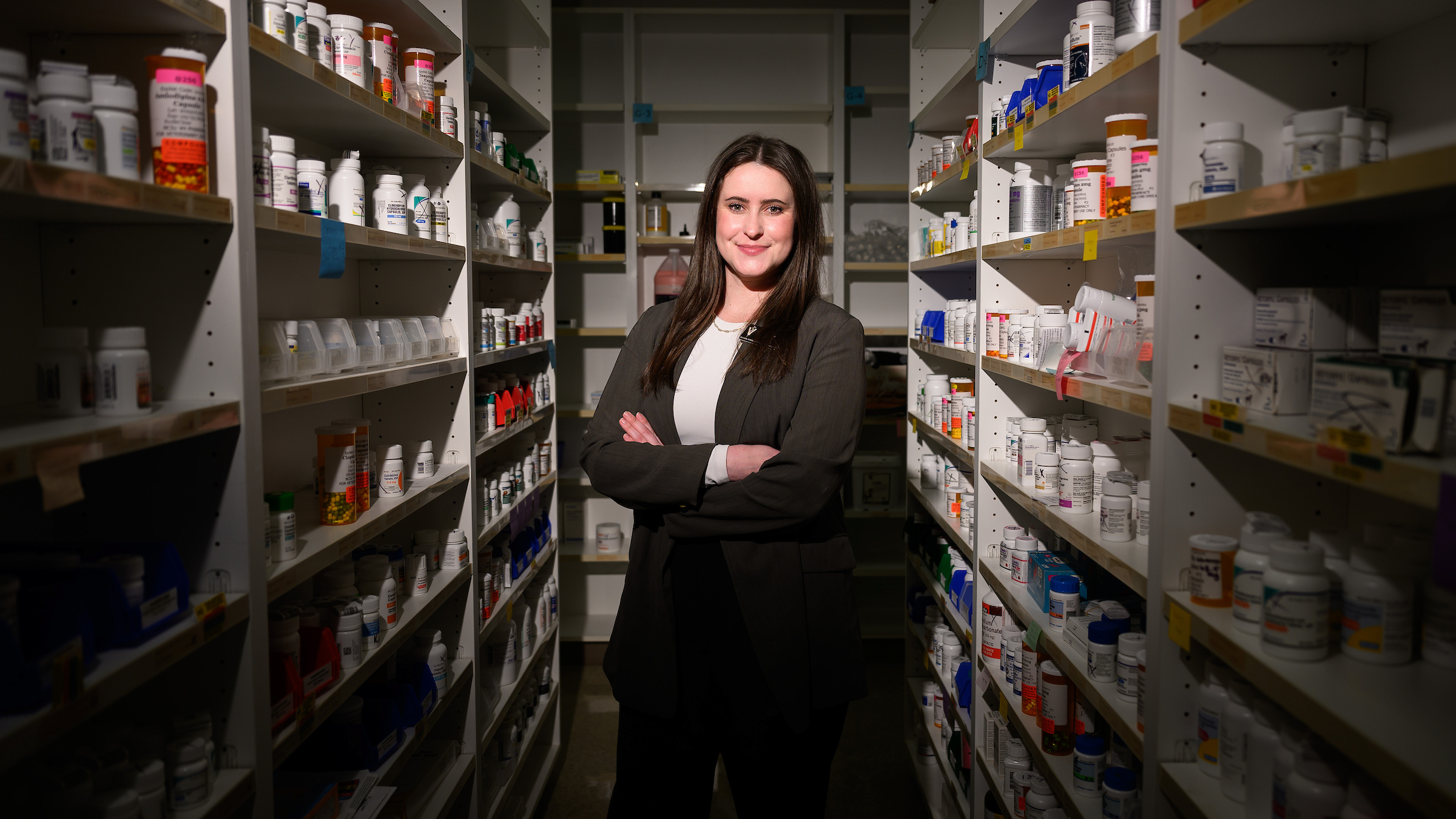
Few people can say that a chance reading of a news article helped them find their dream career, but Dr. Cassie Donnell can.
Donnell, a second-year clinical veterinary pharmacy resident at the NC State Veterinary Hospital, was an undergraduate student at the University of Tennessee studying animal science and working at a local dairy farm when she began learning about antibiotic use in farming.
At that time in 2017, she was searching for a career path that could blend her enthusiasm for animals and clinical practice, but she was uninterested in becoming a veterinarian. Her mother, noting Donnell’s developing interest in livestock drug residue avoidance, sent her an article she’d found about veterinary pharmacists.
“I’d never heard of that field before,” Donnell says. “And once I figured out how pharmacists played a role in understanding how medications can be used safely without impacting the food supply, I was like, ‘This is a weird niche of pharmacy inside of industry practice.’ So then I thought, ‘Maybe I’ll pursue veterinary pharmacy and focus on working with food animals.’”
A bachelor’s and PharmD later, Donnell works at the NC State Veterinary Hospital’s pharmacy, albeit with small animals. She has also carried her interest in mindful antibiotic usage from the Knoxville dairy farm to Raleigh as a consultant on NC State’s Antimicrobial Stewardship Committee.
Only four universities offer veterinary pharmacy residencies in the United States, and NC State’s program is the only one to offer two positions. All other universities’ programs last just one year, but NC State is piloting a two-year program that is allowing Donnell and her co-resident, Dr. Skyler Moore, to advance their training. This term mirrors the layout of a human hospital pharmacy residency.
“It’s really cool to be part of a group that’s pioneering this new structure,” Donnell says. “Expanding our specific field in this way improves our credibility among the pharmacy community and also improves our specialization. It provides a role for us in different hospital settings, so it expands our career paths. I’m thrilled that I get to be part of that.”
‘Same Story, but Different Book’
Donnell grew up riding horses, a hobby she continued through the University of Tennessee Equestrian Team, and was introduced to dairy production while in college. After seeing pharmacokinetics in action and learning of veterinary pharmacy, she set about studying it.
Pharmacists are the only health care professionals licensed to treat both animals and humans, and trainees attend the same pharmacy schools regardless of target patient species. Many schools offer specialized veterinary electives and allow students to complete rotations at veterinary hospital pharmacies to train with animal patients.

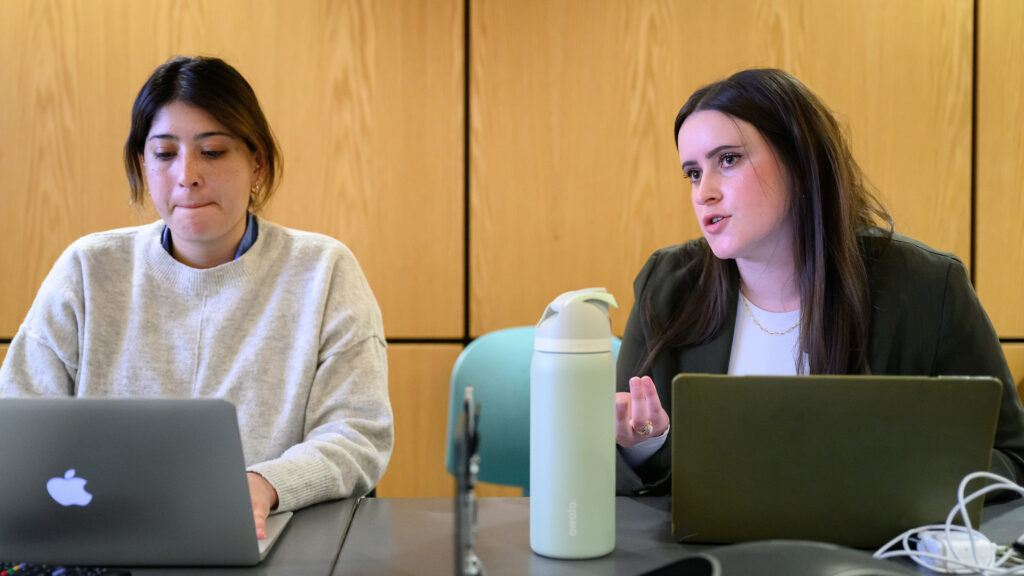
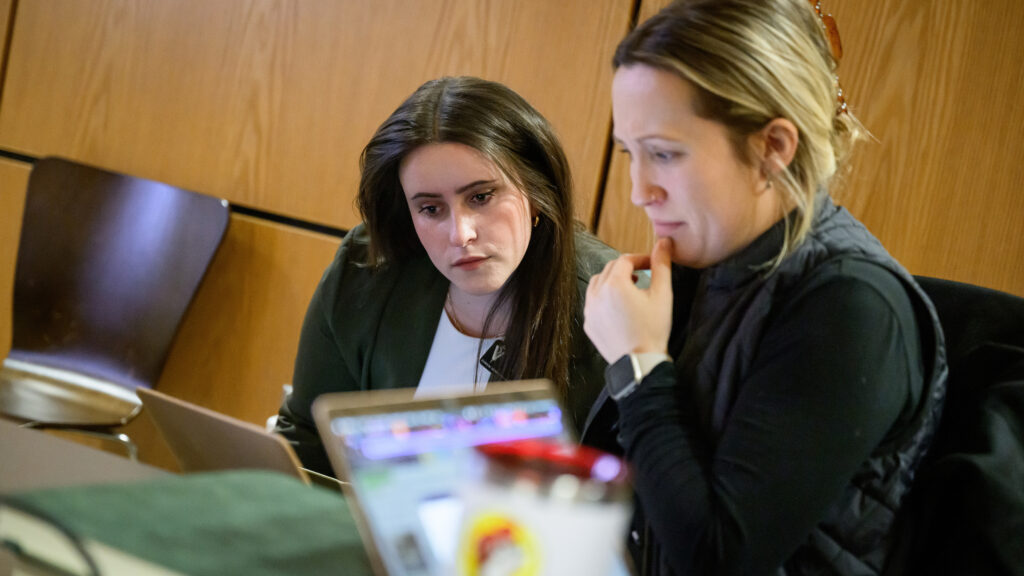
After graduating with her bachelor’s in 2019, Donnell attended the University of North Carolina at Chapel Hill Eshelman School of Pharmacy.
She took every opportunity she could to learn about animal medicine, including an elective on the physiology and pathophysiology of veterinary species taught by Dr. Emily Sorah Campbell, director of clinical pharmacy services at the NC State Veterinary Hospital.
“We use a lot of the same medications in humans and in animals, but a lot of them are used very differently because the physiology of dogs, cats and humans varies greatly,” Donnell says. “It’s the same story, but different book.”
In Donnell’s second year, she began working at the NC State Veterinary Hospital as a student intern and continued that work throughout pharmacy school. She completed an advanced rotation there during her fourth year, too.
Donnell also got involved with the Food Animal Residue Avoidance Databank, or FARAD. NC State is a leading member of FARAD, which advises veterinarians on the safe use of medication in food animals.
Donnell collaborated on a study from the University of California, Davis reviewing antimicrobial withdrawal times in goats and sheep, a project that stoked her passion for responsible antimicrobial stewardship. Improper dosing of antibiotics can lead to antimicrobial resistance, through which bacteria stop responding to medication.
“There’s often an expectation that if your animal presents sick to a veterinary clinic, they’re going to receive antibiotics, and that might not necessarily be the right solution,” Donnell says. “It could actually be harmful for your animal, in many situations, and have long-term downstream effects as well.”
When applying for residency, Donnell knew she wanted to stay at NC State because of her connections. The training program’s two positions also meant that she would have a companion throughout her experience.
In 2023, the same year she graduated with her PharmD, Donnell officially joined NC State as a full-time pharmacy resident.
A Dose of Confidence
Donnell’s favorite part of pharmacy school had been clinical rotations, where she worked on interprofessional hospital teams and witnessed pharmacists’ impact on patient care. She hoped to similarly embed herself within an NC State Veterinary Hospital service to teach veterinarians pharmacology and ensure patient safety.
NC State’s pharmacy residency has allowed her to do just that. Six months into her program, Donnell was invited to join the small animal internal medicine team for a rotation that proved to her and the service how valuable a dedicated decentralized pharmacist can be.
She has chosen to remain with that team since, prompting her switch to small animal medicine.
“I’ve gotten to be involved in some really critical cases with a diversity of therapies in which a pharmacist can play a huge role,” Donnell says. “For example, ensuring that there are no drug interactions, providing recommendations for renal and hepatic dose adjustments, offering suggestions for therapy optimization and choosing critical antibiotics.”
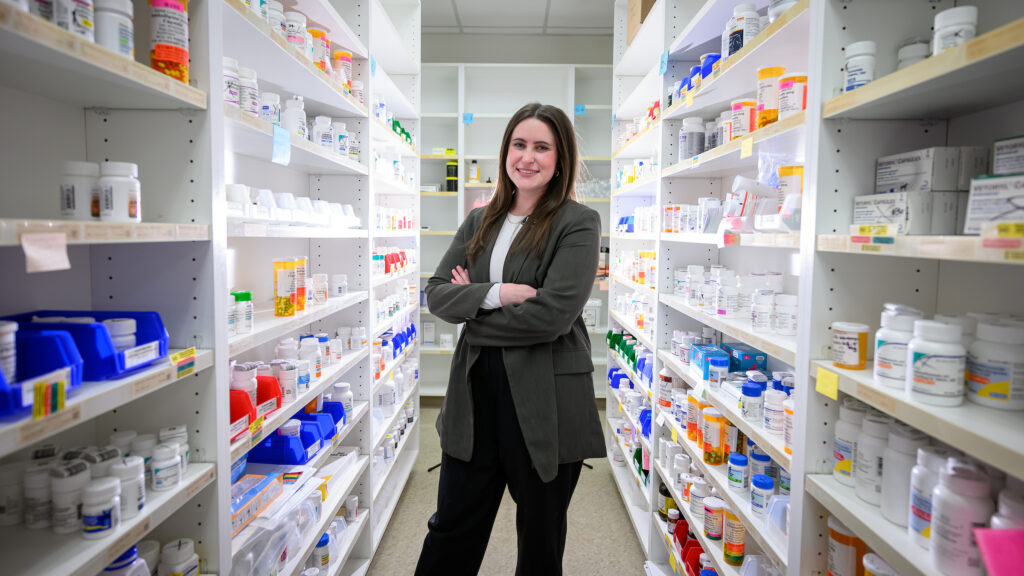
She starts her days by reviewing patient cases and rounding with the internal medicine team. Then she answers inquiries for the hospital’s internal drug information service and reviews consult requests for the Antimicrobial Stewardship Committee. Lately, she has also been updating the committee’s database on breakpoints, or lab values used to assess a bacteria’s susceptibility to antimicrobial agents.
In the afternoon, Donnell often compiles pharmaceutical educational material and can be found teaching visiting pharmacy students who rotate through the Veterinary Hospital from universities nationwide. She serves as a co-preceptor for the hospital’s pharmacy teaching program with her mentor, Dr. Campbell.
“Dr. Donnell has built a strong rapport with colleagues throughout the hospital and has made invaluable contributions to the hospital’s Antimicrobial Stewardship Committee,” Campbell says. “She has embodied our pharmacy’s mission to be on the forefront of veterinary pharmacy practice, and I’m certain this is only the beginning.”
Like many of her peers, Donnell has developed an affinity for academia. She hopes to continue her clinical, stewardship and teaching work at a university-affiliated veterinary hospital after her residency ends this summer.
“My NC State experience has been absolutely incredible,” she says. “I feel so welcomed in an environment where pharmacists may not always have been involved in all of these different roles. In the pharmacy itself, we have amazing, supportive and incredibly knowledgeable staff. I can’t imagine going into vet med without having this residency.”
This article is part of a series featuring house officers across the NC State College of Veterinary Medicine and Veterinary Hospital. Click here to find previous House Officer Highlight stories.
- Categories:

